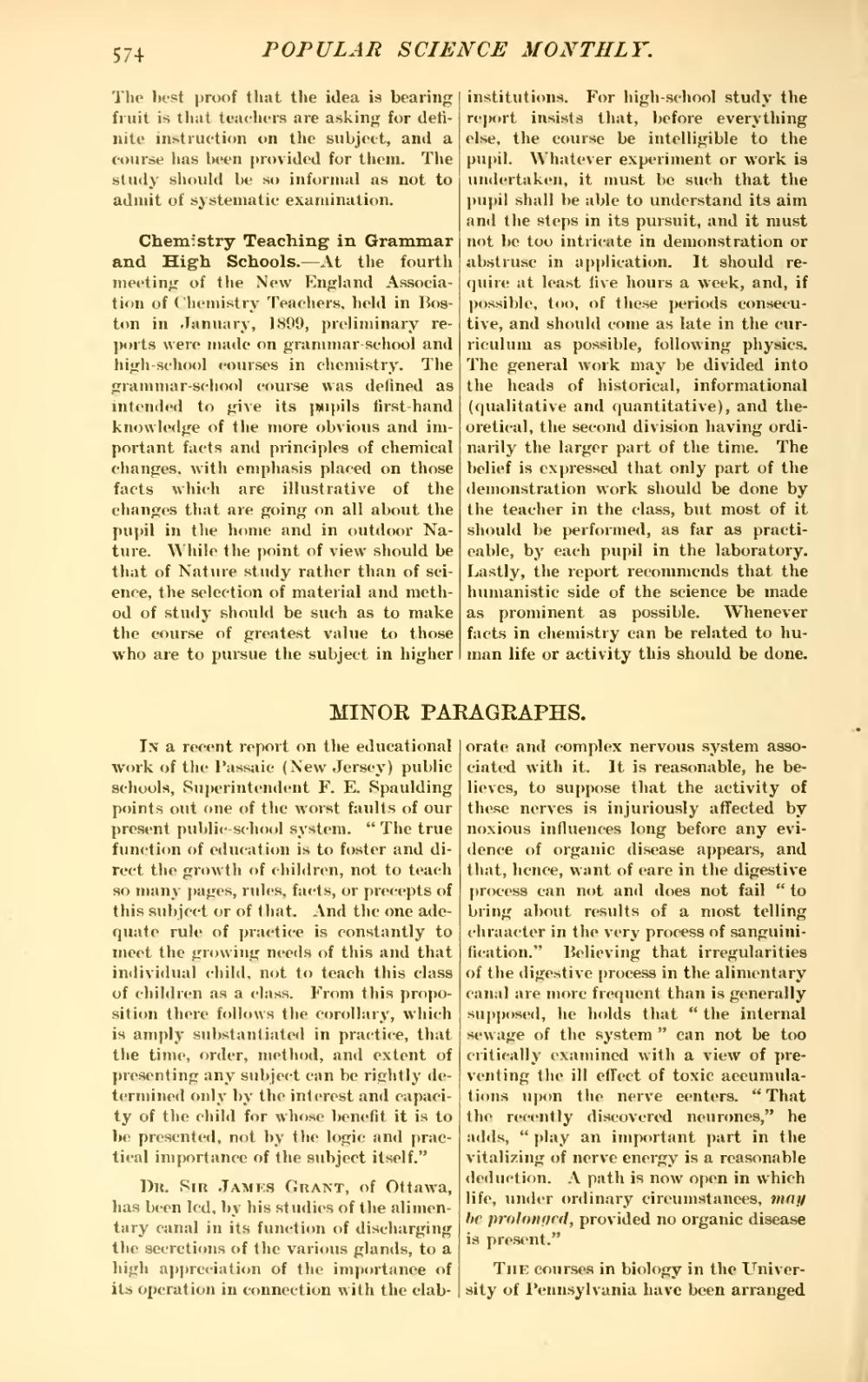The best proof that the idea is bearing fruit is that teachers are asking for definite instruction on the subject, and a course has been provided for them. The study should be so informal as not to admit of systematic examination.
Chemistry Teaching in Grammar and High Schools.—At the fourth meeting of the New England Association of Chemistry Teachers, held in Boston in January, 1899, preliminary reports were made on grammar-school and high-school courses in chemistry. The grammar-school course was defined as intended to give its pupils first-hand knowledge of the more obvious and important facts and principles of chemical changes, with emphasis placed on those facts which are illustrative of the changes that are going on all about the pupil in the home and in outdoor Nature. While the point of view should be that of Nature study rather than of science, the selection of material and method of study should be such as to make the course of greatest value to those who are to pursue the subject in higher institutions. For high-school study the report insists that, before everything else, the course be intelligible to the pupil. Whatever experiment or work is undertaken, it must be such that the pupil shall be able to understand its aim and the steps in its pursuit, and it must not be too intricate in demonstration or abstruse in application. It should require at least live hours a week, and, if possible, too, of these periods consecutive, and should come as late in the curriculum as possible, following physics. The general work may be divided into the heads of historical, informational (qualitative and quantitative), and theoretical, the second division having ordinarily the larger part of the time. The belief is expressed that only part of the demonstration work should be done by the teacher in the class, but most of it should be performed, as far as practicable, by each pupil in the laboratory. Lastly, the report recommends that the humanistic side of the science be made as prominent as possible. Whenever facts in chemistry can be related to human life or activity this should be done.
In a recent report on the educational work of the Passaic (New Jersey) public schools. Superintendent F. E. Spaulding points out one of the worst faults of our present public-school system. "The true function of education is to foster and direct the growth of children, not to teach so many pages, rules, facts, or precepts of this subject or of that. And the one adequate rule of practice is constantly to meet the growing needs of this and that individual child, not to teach this class of children as a class. From this proposition there follows the corollary, which is amply substantiated in practice, that the time, order, method, and extent of presenting any subject can be rightly determined only by the interest and capacity of the child for whose benefit it is to be presented, not by the logic and practical importance of the subject itself."
Dr. Sir James Grant, of Ottawa, has been led, by his studies of the alimentary canal in its function of discharging the secretions of the various glands, to a high appreciation of the importance of its operation in connection with the elaborate and complex nervous system associated with it. It is reasonable, he believes, to suppose that the activity of these nerves is injuriously affected by noxious influences long before any evidence of organic disease appears, and that, hence, want of care in the digestive process can not and does not fail "to bring about results of a most telling character in the very process of sanguinification." Believing that irregularities of the digestive process in the alimentary canal are more frequent than is generally supposed, he holds that "the internal sewage of the system" can not be too critically examined with a view of preventing the ill effect of toxic accumulations upon the nerve centers. "That the recently discovered neurones," he adds, "play an important part in the vitalizing of nerve energy is a reasonable deduction. A path is now open in which life, under ordinary circumstances, may be prolonged, provided no organic disease is present."
The courses in biology in the University of Pennsylvania have been arranged

